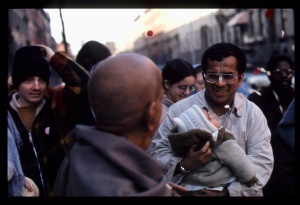CC Adi 7.168 (1975)

A.C. Bhaktivedanta Swami Prabhupada
TEXT 168
- ei ta' kahila pañca-tattvera vyākhyāna
- ihāra śravaṇe haya caitanya-tattva jñāna
SYNONYMS
ei ta'-this; kahila—described; pañca-tattvera—of the Pañca-tattva; vyākhyāna—explanation; ihāra—of this; śravaṇe—hearing; haya—becomes; caitanya-tattva—the truth of Śrī Caitanya Mahāprabhu; jñāna—knowledge.
TRANSLATION
I thus explain the truth of the Pañca-tattva. One who hears this explanation increases in knowledge of Śrī Caitanya Mahāprabhu.
PURPORT
The Pañca-tattva is a very important factor in understanding Śrī Caitanya Mahāprabhu. There are sahajiyās who, not knowing the importance of the Pañca-tattva, concoct their own slogans, such as bhaja nitāi gaura, rādhe śyāma, japa hare kṛṣṇa hare rāma or śrī-kṛṣṇa-caitanya prabhu-nityānanda hare kṛṣṇa hare rāma śrī-rādhe govinda. Such chants may be good poetry, but they cannot help us to go forward in devotional service. In such chants there are also many discrepancies, which need not be discussed here. Strictly speaking, when chanting the names of the Pañca-tattva, one should fully offer his obeisances: śrī-kṛṣṇa-caitanya prabhu-nityānanda śrī-advaita gadādhara śrīvāsādi-gaura-bhakta-vṛnda. By such chanting one is blessed with the competency to chant the Hare Kṛṣṇa mahā-mantra without offense. When chanting the Hare Kṛṣṇa mahā-mantra, one should also chant it fully: Hare Kṛṣṇa, Hare Kṛṣṇa, Kṛṣṇa Kṛṣṇa, Hare Hare Hare Rāma, Hare Rāma, Rāma Rāma, Hare Hare. One should not foolishly adopt any of the slogans concocted by imaginative devotees. If one actually wants to derive the effects of chanting, one must strictly follow the great ācāryas. This is confirmed in the Mahābhārata: mahā-jano yena gataḥ sa panthāḥ. "The real path of progress is that which is traversed by great ācāryas and authorities."